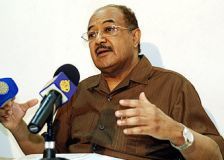Sudanese Darfur crimes court starts work, rebels cry foul
KHARTOUM, June 14 (AFP) — Sudan’s new court to try Darfur war criminals began work Tuesday but rebels and rights groups slammed it as a deliberate bid by the government to avoid prosecutions by an international tribunnal.

|
|
Sudan’s Justice Minister Ali Mohamed Yassin. (AFP). |
UN Secretary General Kofi Annan’s special representative in Sudan, Jan Pronk, welcomed the creation of the court but warned it could not replace the International Criminal Court in The Hague.
“It was a positive step but it was late… The train has left the station and the Sudan government will have to do it both ways… A national court cannot be a substitute to an international one,” Pronk told reporters.
Justice Minister Ali Mohammed Yassin announced Monday that some 160 suspects would appear before a special court to try war crimes committed in the western region of Darfur.
“The court will be an alternative to the International Criminal Court,” he said, a week after the ICC said it had launched an inquiry into the atrocities perpetrated in the war-torn region.
On Tuesday, a team of judges from the new court went to Nyala, the capital of South Darfur state, and met with the governor ahead of the first hearings.
The new court will be based in El Fasher, the main city in North Darfur state, but Yassin said that most of the suspects to go on trial hailed from South Darfur.
The two Darfur rebel movements, which have waged a bloody civil war with government forces since the beginning of 2003, fiercely condemned the move as an attempt by Khartoum to circumvent international law.
“The Sudan Liberation Movement does not accept this special court. The so-called 160 suspects the court is planning to try are petty criminals,” said SLM spokesman Mahjoub Hussein.
“The goverment is again playing games and trying to buy time. We want the criminals from the government and the only authority we recognise to carry out this process is the International Criminal Court,” he told AFP.
The SLM’s smaller rival, the Justice and Equality Movement, also demanded that any crimes related to the Darfur war should be dealt with by the ICC.
“The Sudanese judicial system is not qualified to carry out this sort of trials,” the group said.
It charged that the penal code did not have sufficient provisions to handle the cases and questioned the independence of Sudan’s judiciary.
“The International Criminal Court alone should decide if the government should prosecute those criminals,” the JEM said.
Both groups stressed that those they wanted to see put on trial were the 51 suspects identified in January by a UN fact-finding mission.
The special court’s chairman, Judge Mahmoud Saeed Abkem, said they would be tried “if they are brought to the court by the Sudanese committees of inquiry.”
Amnesty International warned Monday that the Sudanese court “lacks credibility” unless Khartoum carries out “serious legal reforms ensuring independence of the judiciary”.
“We fear that the establishment of the special court may just be a tactic by the Sudanese goverment to avoid prosecution” before the ICC, said Kolawole Olaniyan, the director of Amnesty International’s Africa programme.
“On the one hand, the Sudanese government is claiming that it is able to punish the crimes it is accused of condoning for the last two years,” he said in a statement.
“On the other hand, it continues to crack down on those who expose or criticise such human rights violations.”
Between 180,000 and 300,000 people have been killed and 2.4 million made homeless in Darfur since an uprising in early 2003 prompted Khartoum to unleash militias in a scorched-earth campaign.
President Omar al-Beshir vowed in April never to hand over any Sudanese to international jurisdiction.
